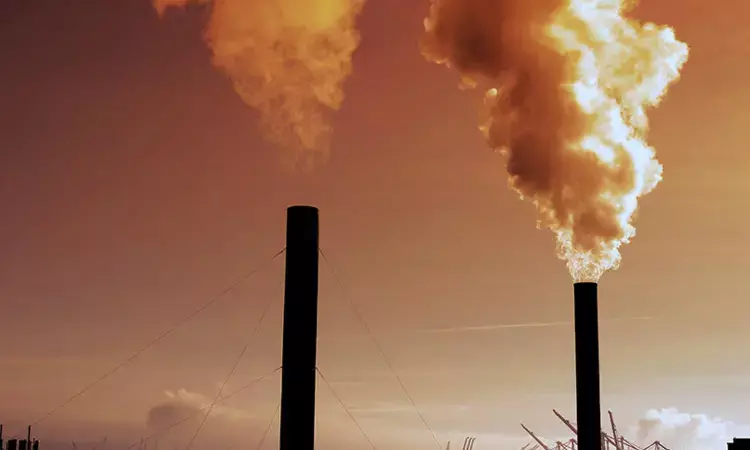- Home
- Medical news & Guidelines
- Anesthesiology
- Cardiology and CTVS
- Critical Care
- Dentistry
- Dermatology
- Diabetes and Endocrinology
- ENT
- Gastroenterology
- Medicine
- Nephrology
- Neurology
- Obstretics-Gynaecology
- Oncology
- Ophthalmology
- Orthopaedics
- Pediatrics-Neonatology
- Psychiatry
- Pulmonology
- Radiology
- Surgery
- Urology
- Laboratory Medicine
- Diet
- Nursing
- Paramedical
- Physiotherapy
- Health news
- Fact Check
- Bone Health Fact Check
- Brain Health Fact Check
- Cancer Related Fact Check
- Child Care Fact Check
- Dental and oral health fact check
- Diabetes and metabolic health fact check
- Diet and Nutrition Fact Check
- Eye and ENT Care Fact Check
- Fitness fact check
- Gut health fact check
- Heart health fact check
- Kidney health fact check
- Medical education fact check
- Men's health fact check
- Respiratory fact check
- Skin and hair care fact check
- Vaccine and Immunization fact check
- Women's health fact check
- AYUSH
- State News
- Andaman and Nicobar Islands
- Andhra Pradesh
- Arunachal Pradesh
- Assam
- Bihar
- Chandigarh
- Chattisgarh
- Dadra and Nagar Haveli
- Daman and Diu
- Delhi
- Goa
- Gujarat
- Haryana
- Himachal Pradesh
- Jammu & Kashmir
- Jharkhand
- Karnataka
- Kerala
- Ladakh
- Lakshadweep
- Madhya Pradesh
- Maharashtra
- Manipur
- Meghalaya
- Mizoram
- Nagaland
- Odisha
- Puducherry
- Punjab
- Rajasthan
- Sikkim
- Tamil Nadu
- Telangana
- Tripura
- Uttar Pradesh
- Uttrakhand
- West Bengal
- Medical Education
- Industry
Short term exposure to environmental air pollution aggravates psoriasis flare: JAMA

Verona, Italy: Francesco Bellinato led a team in a study that states that psoriasis flare-ups may be triggered by air pollution. The findings were published in the Journal of American Medical Association Dermatology.
Psoriasis is a relapsing-remitting inflammatory disease that affects the skin. Infections, stressful life events, and medicines, among other things, can cause illness flare-ups. It's still unclear if air pollution may cause psoriasis flare-ups. This study was conducted with the aim to look into whether short-term exposure to pollutants in the environment is linked to psoriasis flare-ups.
This observational study assessed longitudinal data from patients with chronic plaque psoriasis who attended the University Hospital of Verona's outpatient dermatologic clinic on a regular basis from September 2013 to January 2020, using a case-crossover and cross-sectional methodology. Patients who experienced at least one disease flare, defined as a Psoriasis Area and Severity Index (PASI) rise of 5 or higher between two consecutive evaluations in a time range of 3 to 4 months, were included in the case-crossover analysis.
Patients with grade 2 or higher successive PASI assessments were included in the cross-sectional study if they had received any systemic therapy for 6 months or more. In the 60 days leading up to the psoriasis flare and the control visits, mean and cumulative (area under the curve) concentrations of several air pollutants (carbon monoxide, nitrogen dioxide, other nitrogen oxides, benzene, coarse particulate matter [PM; 2.5-10.0μm in diameter, PM10] and fine particulate matter [2.5μm in diameter, PM2.5]) were compared.
The key findings are as follow:
1. The study comprised 957 plaque psoriasis patients with a total of 4398 follow-up visits. The average age of the patients was 61, with 602 (62.9%) of them being men.
2. More than 15 000 air pollutant concentration readings were gathered from the official, open-source bulletin of the Italian Institute for Environmental Protection and Research (ISPRA). The case-crossover research comprised 369 (38.6%) individuals with psoriasis flare from the entire cohort.
3. When comparing the 60 days preceding a psoriasis flare to the control visit, we discovered that all pollutant concentrations were considerably higher.
4. Exposure to mean PM10 over 20 μg/m3 and mean PM2.5 over 15 μg/m3 in the 60 days before the assessment was linked to a higher probability of PASI 5 or larger point deterioration in the cross-sectional study.
5. Similar findings were found in sensitivity analyses stratified by trimester of evaluation, with varying lags of exposure and controlling for kind of therapy.
In conclusion, short-term exposure to air pollution is linked to higher psoriasis activity and the risk of a psoriasis flare. More research is needed to see if these findings apply to other populations and to learn more about the processes that cause psoriasis disease activity to be affected by air pollution.
Reference:
Bellinato F, Adami G, Vaienti S, et al. Association Between Short-term Exposure to Environmental Air Pollution and Psoriasis Flare. JAMA Dermatol. Published online February 16, 2022. doi:10.1001/jamadermatol.2021.6019
Medical Dialogues consists of a team of passionate medical/scientific writers, led by doctors and healthcare researchers. Our team efforts to bring you updated and timely news about the important happenings of the medical and healthcare sector. Our editorial team can be reached at editorial@medicaldialogues.in.
Dr Kamal Kant Kohli-MBBS, DTCD- a chest specialist with more than 30 years of practice and a flair for writing clinical articles, Dr Kamal Kant Kohli joined Medical Dialogues as a Chief Editor of Medical News. Besides writing articles, as an editor, he proofreads and verifies all the medical content published on Medical Dialogues including those coming from journals, studies,medical conferences,guidelines etc. Email: drkohli@medicaldialogues.in. Contact no. 011-43720751


